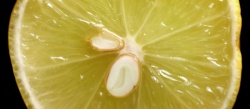Noroviruses
Lemon juice and human norovirus
Citric acid may prevent the highly contagious norovirus from infecting humans, scientists discovered from the German Cancer Research Center. Therefore, lemon juice could be a potentially safe and practical disinfectant against the most common pathogen of severe gastrointestinal infections.

Noroviruses are the predominant cause of gastroenteritis outbreaks in community settings such as hospitals, cruise ships, and schools. The virus is extremely contagious and is mostly transmitted via "fecal-oral-route", i.e., through contaminated hands or contaminated food. Symptoms include violent and sudden onset of diarrhea, vomiting, and nausea.
"It is therefore important to provide a safe and harmless disinfectant against human norovirus," explains Grant Hansman, head of CHS junior research group at the German Cancer Research Center noroviruses and the University of Heidelberg. The group is funded by the CHS Foundation. Some older observations found that fruit extracts, such as orange or pomegranate juice, could reduce the infectivity of surrogate noroviruses.
This current study was a continuation of an earlier project conducted at the National Institutes of Health in the United States, where they discovered that citrate from a commercial company could bind to the norovirus capsid protein. "However, it was only by chance that this discovery was made, like a lot of scientific research, but it turns out to be very interesting." Dr Hansman explains.
Human noroviruses does not grow in cell culture, so they tested the effects of increasing concentrations of citric buffer on the so called norovirus virus-like particles, which have the same surface characteristics as real viruses. Dr Hansman and his staff show that the virus particles change their shape after citrate binding. X-ray crystal structures revealed that the citrate - from lemon juice or citrate disinfectants - precisely interacts at the binding pocket on the particle that is involved in attaching to host ligands – the so-called histo-blood group antigens.
These new results may explain why citrate reduces the infectivity of noroviruses. "Maybe a few drops of lemon juice on contaminated food or surfaces may prevent the transmission of these viruses," speculates Hansman. With his staff, he now plans to investigate if citric acid could reduce symptoms in those already infected with noroviruses.
Reference:
Anna D. Koromyslova, Peter White, and Grant S. Hansman: Citrate alters norovirus particle morphology. Virology 2015, DOI: 10.1016/j.virol.2015.07.009
26.08.2015


